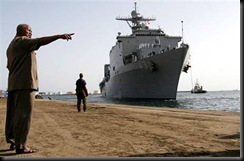U.S. woos Africans with naval diplomacy
 DAKAR, Senegal - As it steams down the West African coast, the USS Fort McHenry faces one of its toughest battles: to convince skeptical Africans their continent can benefit from more U.S. military involvement.
DAKAR, Senegal - As it steams down the West African coast, the USS Fort McHenry faces one of its toughest battles: to convince skeptical Africans their continent can benefit from more U.S. military involvement.
The 600-foot ship, which saw combat in the first Gulf War, is embarking on a six-month mission to train West African navies to fight drug smuggling and maritime security threats in a region which supplies nearly a fifth of U.S. oil imports, rivaling the Middle East.
Once a rarity, U.S. warships will become a familiar sight in the Gulf of Guinea under the new African Partnership Station (APS) scheme launched last week. Washington will maintain a constant naval presence in the strategically important region, providing training and humanitarian aid.
"In the past, we have been guilty of what some would call episodic engagement," said Captain John Newell, head of U.S. navy operations in Africa, on the Fort McHenry's towering bridge. "Now, the idea behind the Africa Partnership Station is that it is a persistent presence.""It's not only about maritime security and safety but also building relationships and partnerships," he said.
The mission is the first since the United States launched its African military command (Africom) last month amid concerns voiced by diplomatic heavyweights South Africa and Nigeria, which fear an attempt to enforce Washington's policies.
Since 2002, the United States has garrisoned 1,800 troops in Djibouti to counter terrorist threats in the Horn of Africa, but Africa remained a backwater under the European military command.
Valuable resources
The U.S. military's reputation in Africa has been tarnished, particularly in Muslim nations, by the Iraq war. Many Africans see the creation of Africom as a sign of Washington's determination to control valuable oil and mineral resources, particularly given a rising Chinese presence on the continent.
U.S. officials have downplayed these fears, saying there will be no new military bases and the focus will be on training African armies, facilitating peacekeeping and distributing aid.
The aim of APS, Newell said, was for African nations to take control of their resource-rich waters, bringing development and stability to a region notorious for coups and wars.
"It's not just about the oil but this region is certainly of strategic concern to the international community and the United States because of its resources," Newell told Reuters when the ship docked in Dakar. "Stability here is good for stability internationally, is good for stability in the United States."
The United States is already active in military assistance and training across Africa, spending an estimated $250 million a year, analysts say.
Training naval officers
The new maritime initiative has already won plaudits.
"It was a really wonderful experience for different African countries and their officers to come on board," said Aminu Mai, a lieutenant in the Nigerian navy, in a classroom with students from Senegal, Nigeria, Ghana, Cameroon and Equatorial Guinea.
The USS Fort McHenry will visit Senegal, Ghana, Liberia, Gabon, Cameroon and Sao Tome during its tour and provide not just training in ports but onboard classes for up to 100 African naval officers who will travel aboard ship during its voyage.
The amphibious vessel carries landing craft and small vessels in a rear docking bay and its shallow draft allows it to call in smaller West African ports. It has been fitted to hold up to 200 students during port visits.
U.S. woos Africans with naval diplomacy - Africa - msnbc.com

